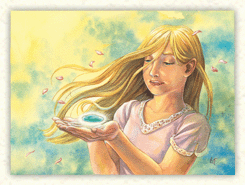![]()
The Star Shard
Part 1
by Frederic S. Durbin
illustrated by Emily Fiegenschuh
 Cymbril sang. Her voice filled the dining hall like a pure liquid, drifting out through the narrow windows under the rafters. In her thoughts she floated away with the notes, riding the warm breeze over forests and fields; but in reality, she could go nowhere. The huge wooden doors of the Rake were shut with her inside, a prisoner in the biggest of all cages. It was her duty to sing.
Cymbril sang. Her voice filled the dining hall like a pure liquid, drifting out through the narrow windows under the rafters. In her thoughts she floated away with the notes, riding the warm breeze over forests and fields; but in reality, she could go nowhere. The huge wooden doors of the Rake were shut with her inside, a prisoner in the biggest of all cages. It was her duty to sing.
To say that the Thunder Rake was a wagon would be to call the sea a puddle, for the Rake was a fortified city, full of workshops and stables, houses, towers, gardens--even a rippling canal. But it also had wheels rimmed with steel, each one seven times as tall as a man, and it had arms made of gigantic tree trunks that slid back and forth, three along each side. Metal claws on the ends crashed down and sank into the earth each time an arm came forward. Like a gargantuan living creature, the Thunder Rake crawled over hills and through valleys. The folk of towns and cities could hear the Rake coming with its axles squeaking, with rumbles and booms, claw after claw. People flung wide their gates and flocked out to buy exotic cloth, spices, glass, tools, and hundreds of other goods from the Rake’s merchants. All the world was a market, said Rombol, Master of the Rake: everything could be had for a price.
What was the price of freedom, Cymbril wondered--or happiness? She finished her song and bowed to those who clapped with greasy hands. Tomorrow another grand circuit would begin, another journey of selling. The merchants had been busy stockpiling and crafting. Many were already snoring, their heads on the tables in the flickering, oily light. As Cymbril lifted her hem and carefully stepped down from the oaken chest that served as her stage, the table clearers padded along the trestles, silent as ghosts. Cymbril moved to help them.
“That will do, Cymbril,” called Master Rombol. Slouched in his carved chair, he licked his fingers and wiped them on his thick, black beard. He pointed at Cymbril with a chicken bone. “Go and rest your voice now. Tomorrow we roll into Highcircle, where the crowds await with purses jingling.”
Several of the groggy merchants grinned.
“Be in your blue dress at first light.” Rombol flipped the bone to Bale, the hound at his feet, who caught and crunched it in his massive jaws.
Cymbril curtsied and hurried into the corridor, thinking, If you’re worried about my voice, Master Rombol, why do you make me sing in the pipe smoke? At least during market journeys, she could spend her days in fresh air, and by evenings she had no voice left for the dining hall.
Shutting the door behind her, she leaned against it and breathed in the coolness. This hallway on the Rake’s uppermost level was a street tonight, its ceiling drawn back. Cymbril peered up between high wooden walls at the stars--so many, even in the thin strip of sky--so blazingly bright, and so free. One of the Rake’s cats rubbed against her ankles, and she knelt to stroke its fur. “It’s Highcircle tomorrow, Miwa,” Cymbril told the cat. “You’ll have plenty of new mice to chase.” Miwa purred, her eyes glowing with the blue-green fire of the Fey world. Cats could always see the land of the Faerie folk, or Sidhe, side by side with the world of humankind. Cymbril fingered the stone in her skirt’s pocket. She had a little of the Sidhe’s fire, too.
The gears gnashed, the axles creaked, and the Rake clawed the ground: squeak-boom, squeak-boom, squeak-boom. The Thunder Rake rolled at night; daylight was for buying and selling.
Corridors in the wagon city had names, like streets: Anvil, Longwander, Tinley, Inbrace, Barrel Corner ... Cymbril took the Ferny Way and ducked beneath a grape arbor into a spiral staircase going down. Straight to the lowest level she followed it, her leather slippers pattering. Some people said the colossal wagon had five stories, some said nine, and some said thirteen, for several of the decks were hidden within the walls or couched in balcony half-levels. Despite her explorations, Cymbril had not found a way into three of the inner galleries. But her favorite space lay here, at the stairway’s bottom. She brushed through a curtain of stringy brown vines into the Pushpull Chamber.
Dark and drippy, warm with breath and many bodies, it was the only place Cymbril felt at peace. The Urrmsh occupied the long, narrow room, and of all the people on the Thunder Rake, only the Urrmsh were content.
Even sitting on the rowing benches, they were taller than Cymbril, and as big around as boulders. Dark green and warty, the Urrmsh rocked back and forth, pushing and pulling on the “oars”--wooden levers that turned the gears that worked the tremendous claws of the Rake, gouging the ground, drawing the mighty vessel forward. Their mouths and round eyes were like those of frogs; they had no ears, only nostril slits for noses, and short, thick legs. Most amazing were their muscular arms, so long they could reach to the floor, with hands that could crush a rock to powder. Humans, who generally had trouble trilling the r in “Urrmsh,” also called them the Armfolk or the Strongarms.
They smiled wide smiles as Cymbril passed between them, some pausing in their song to call her name or tap a fingertip on her head. She beamed and waved back, but she didn’t try saying their names. Whenever she thought she’d learned them, the Armfolk changed places, rowing on different sides so that one arm wouldn’t grow stronger than the other. The Urrmsh were nearly always singing, sometimes one by one, sometimes all together. The words were in the Armfolk’s own language, which sounded something like the gurgle of rain through gutters, something like the purring of giant cats. “We sing our songs,” the Urrmsh had explained to Cymbril. “We tell our tales, and we push, and we pull. It is a good life.”
One Strongarm she could always find was Urrt, because of his especially lumpy head, his lopsided smile, and his great size. He was several hundred years old—not at all old by Urrmsh standards. (None of the Armfolk kept a very careful count of their ages, though many of them remembered the world from when it was quite different.) Tonight Urrt was rowing on the right, at the very front. Cymbril threaded her way up the center aisle, stepping over the puddles that leaked from the canal above. The Strongarms liked to be wet. They glistened in the light from two rows of lanterns on strings.
There were just over three hundred of the Armfolk in the Pushpull Chamber, half on each side, two on each bench; the room itself lay in the center of the Rake’s belly. Cymbril marveled that even this many rowers could move the Rake. It was a matter of levers, Urrt had told her: with a lever long enough, you could topple a mountain.
Cymbril settled in the dry front corner against a bulkhead, Urrt towering like a cliff above her. Pulling up her knees, she wedged her toes against the edge of his foot, its toenails cracked and yellow with age. He said nothing, but his gentle eyes watched her each time he rocked forward, his fingers locked on the limb-thick oar. When the song rolled toward Urrt, he sang, his deep voice resonating in the boards. Cymbril hummed on the same pitch.
She untied the silver twine from her hair, pulling free the jeweled pin. Her hair tumbled over her shoulders. Sliding the twine into her pocket, she withdrew the stone and laid her two treasures on the “table” made by her skirt between her knees.
A stone from her father, a hairpin from her mother ... but Cymbril had no faces to go with the words. Mother ... Father. They had both died of the plague that swept the village where Cymbril had been born. After that, there had been an old woman who cared for Cymbril--or fed her, at least. Cymbril mostly remembered her red scarf and hairy chin. Then there was the Thunder Rake, and a woman of bony angles who’d taught Cymbril to sing. Selene--that was the woman’s name. On the day Master Rombol sold Selene in Banburnish Crossing, Cymbril had learned that even people had prices. She’d understood then that Rombol wasn’t her uncle or a charitable merchant who’d given her a home. He had bought her with shiny coins, just as people bought songbirds to keep in cages.
Cymbril held the hairpin between her fingers. The tiny jewel at its top absorbed and magnified whatever light was present--just now, the flickering pink of the Pushpull lanterns. The smooth, flat, palm-sized stone from her father, though, always glowed with the blue-green fire of marsh lights, of cats’ eyes ... of the moon on a midnight sea. “Urrt,” Cymbril said suddenly, trilling the r with practiced ease, “tell me again.”
Urrt chuckled, the sound of rocks tumbling. “Never fear, little nightingale. You’ve heard it so often, you’ll never forget.” The thick oar-lever passed back and forth over her head.
“Please tell me again. I like hearing it from you.”
“Well, well,” said Urrt, his voice hushed so as not to disturb the Strongarms’ song--but the song echoed everywhere and could no more be disturbed than the earth’s bones or oceans’ tides. “It is in the songs of the Urrmsh: the stone is from your father and is the color of his eyes. The pin is from your mother and once adorned her hair. She was the most beautiful woman in the Misty Vales, and the sweetest singer, too. You, Cymbril, have her face and her voice.” He glanced sideways at her with a full-moon eye. “Someday, little thrush, you must learn to sing in Urrmsh.”
Cymbril smiled. The Urrmsh traveled everywhere; there were many others besides those on the Rake. In woods and swamps, on grassy hills, they gathered to exchange their songs. The music wove together news and wisdom in ways that made the important things hard to forget. Cymbril carefully let the treasures slip back and forth in the lap of her skirt--a bright circle, a pink spark. If she squinted, they looked like a firefly and the moon.
She was just beginning to feel drowsy when a long, braying tone resounded through the chamber, shattering the song. Wiltwain’s horn.
“Hooooo!” called the Strongarms together and leaned back on their oars. Behind the walls, winches shuddered. Out in the night, the Rake’s wheels ground to a halt. The steel claws plunged into the ground and rested.
Wiltwain the Overseer, Rombol’s second-in-command, had blown the signal on his seashell trumpet. He appeared from the stairway, thrusting his sharp nose and chin through the moss curtain. “Just for a short bit, lads,” he said, his glittering eyes sweeping the ranks of rowers. “We’ve got company coming aboard.”
Company after sundown. What could this mean? Cymbril stowed the treasures in her pocket and sprang to her feet. “See what it is, songbird,” Urrt said when Wiltwain had gone. “But don’t get stepped on.”
Cymbril laid a hand on his enormous knuckle, smiled at him and his bench mate, and dashed one level up the spiral stairs. As she ran along the Hall of Wagons, where the rolling tents and shops stood ready to stream down into Highcircle tomorrow, she heard the snarling of the ramp’s chains. It was unusual for Rombol to lower the ramp after dark. The lands between towns were haunted by robbers, wolves, and worse things--things that the old cooks whispered of in the scullery on winter nights, especially when they wanted to keep the younger girls from giggling around the banked hearth fires. Hurrying forward with a shivery lightness in her chest, Cymbril wondered what might come up the ramp out of the night. Lantern light flared in the lofty hold ahead. There came a murmur of voices, the thump of the jointed ramp unfolding and striking the ground, and the neighing of horses. Rombol called a greeting to someone. Cymbril worked her way forward among the silent carts, their wheels braced with wedges. She was on the first balcony; three more levels soared above, but Rombol and his party--a few merchants and a squad of armored guards--stood on the chamber’s floor one story below, where the ramp slanted down into the dark outside the Rake. Cymbril eased into the driver’s seat of the front wagon, its yoke set against the balcony rail. Peeking over the footrest, she could see Rombol’s group, but they weren’t likely to see her ... unless her hair glimmered. Its gold highlights did that in the glow of fires. She quickly gathered her hair, jammed it down her collar, and pulled her hood close around her face.
Cloaked riders rumbled up into the hold, night mist swirling around the horses’ hoofs. Spurs glinted on muddy boots. Some riders had long bows across their backs. Sheathed swords were tucked beneath their knees, and their eyes shone watchfully in the shadows of their cowls. Cymbril counted seven strangers. They stayed in the saddles but guided their horses to the sides, making way for the eighth newcomer, a woman on a pale chestnut steed. She flung back her hood and shook her flowing hair.
Cymbril drew in her breath. The woman was not particularly tall, but she carried herself in a way that made her seem somehow larger than the rough men around her. A faint scar ran down her left cheek to the jaw. Her wide-set eyes fixed on Rombol. She did not smile.
“Brigit!” Rombol spread his arms as if greeting a close friend, but he kept his distance. "What news?"
“News of your great good fortune,” she said.
Rombol chuckled, hands on his barrel-like waist. “And what good fortune is mine?”
“The fortune of the purchase you are about to make.” Brigit signaled one of her riders, who prodded his black horse forward. Cymbril had thought the rider was a fat man, but when he shrugged open his cloak, she saw that he’d been concealing a child on the saddle before him.
Cymbril stared. It was a boy--but unlike any she’d ever seen. He had a long, beautiful face, a tiny mouth, and shoulder-length hair precisely the color of the moon. He wore a gray tunic that rippled like the swirling patterns of a stream. His luminous eyes shifted in color as the lanterns flickered, now liquid brown, now golden.
Rombol had begun to laugh at Brigit’s words, but the sound snagged in his throat. For a full count of five, he gawked at the boy.
At last Brigit showed the hint of a smile. “Yes. It’s one of them. A Fey child. A Sidhe. They’re not at all easy to catch. But he’ll be worth the price.”
to be continued
(Copyright 2008 by Frederic S. Durbin)





